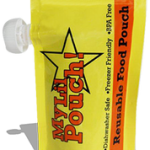A new pregnancy book has hit the market. What makes this one different, I hear you ask? Unlike many others, it’s written by someone who has worked as a community midwife, using her experience of what expectant parents really want and need to know. To celebrate the launch, author Denyse Kirkby has done a special Q&A for my blog.
Q&A with Denyse
Why did you decide to write a book on pregnancy and birth?
My Mini Midwife came about as a result of my years working as a community midwife. I thoroughly enjoyed my time as a community midwife because that kind of midwifery allows you to get to know the people you are caring for to a deeper level than those you meet when you are hospital based. Over time I began to develop a standard set of answers to questions expectant parents, and their families, asked of me about early pregnancy, what kind of care they will be given, what labour is like and so on.
Then one couple said they wished they could carry me around in their handbag so they could ask me questions whenever they needed to, and that was when I had a My Mini Midwife light bulb moment. I decided to write out answers to all the most frequently asked questions I could remember people asking me. When I had finished this the writer in me couldn’t leave it alone – it wasn’t pretty, there was no flow to the words, it needed chapters and so on. So I grouped the questions together and wrote chapters around them. I didn’t want my book to feel like a textbook or a self help book so I kept the tone of my writing the same as I would use when chatting with people while caring for them in pregnancy, labour and in the first few weeks after birth. The result was a pocket-sized midwife that readers could carry around with them everywhere.
What is the most common question you get asked as a midwife?
There are four really:
1) When will I feel my baby (kick/move) for the first time? (anywhere from 14 – 24 weeks pregnancy depending on how many babies you are pregnant with and where you placenta is situated)
2) How long will my labour last? (the answer to this depends on when you count your labour as ‘started’. If you count it from when your contractions are regularly spaced apart but coming every 10 mins or less and lasting for more than 20 seconds then you could be in labour for another 3 – 10 hours depending on how many babies you are pregnant with and how many babies you have had before).
3) How much will labour hurt? (this depends on you as an individual. The only guarantee is that labour will be painful to some degree but it is a different kind of pain to pain from an injury. Labour pain is the pain that comes from your body working hard and you get a break from the pain between each contraction. There are lots of things you can do to ease your pain which are discussed in the chapter on pain relief in My Mini Midwife)
4) How often should my baby feed? (This depends on the method you choose to feed your baby. If you breastfeed then you should feed your baby as often as s/he asks for food – breast milk is both a drink and food so breastfed babies do feed more frequently but their feeding time will vary depending on whether they were thirsty or hungry. Short feeds are thirst quenching only. If you formula feed then you must follow the instructions on the packaging as these vary between the different types of formula. Generally your baby should be having at least 6 wet nappies a day.)
What is the biggest myth surrounding pregnancy do you think?
That you go back to your pre-pregnancy shape immediately after your baby is born. It takes 9 months for your body to adapt to pregnancy and it will take up to a year for your body to gain it’s new shape after birth – your body will not look exactly the same as it did pre-pregnancy and why should it? You’re not exactly the same, you’re a new you. How fast you do this will depend on your genetics, your lifestyle and your age.
What is your best piece of advice you would give expectant mothers or mothers-to be?
The best piece of advice I can give mothers-to-be is that their pregnancy, labour and birth will be completely unique so they need to make decisions based on what they actually want rather than what others think they should want.
If you could make one improvement to the experience of pregnancy for mothers in the UK what would it be?
I would like to see more midwives in employment because this one improvement would mean that more expectant parents could have the care they would like, and that midwives would like to give; more home visits, more community unit and home births and more postnatal visits.
Your new book My Mini Midwife: Everything You Need to Know About Pregnancy and Birth is just published. Where can readers buy the new book?
My Mini Midwife is available in all bookstores and online.
I understand you have a video of basic advice for parents on YouTube. Where can people see this?
People can watch my “Top Ten Tips” video on the dedicated My Mini Midwife page on my website. I will also be launching a forum on my website from the end of February which will be a place for expectant parents to meet others, enjoy the benefits of peer support and chat to me.
Thanks Denyse. I wish I’d had this book when I was expecting!
You can buy My Mini Midwife from Amazon now!







Thank you so much for your kind words about My Mini Midwife, and for allowing me to share space on your blog!